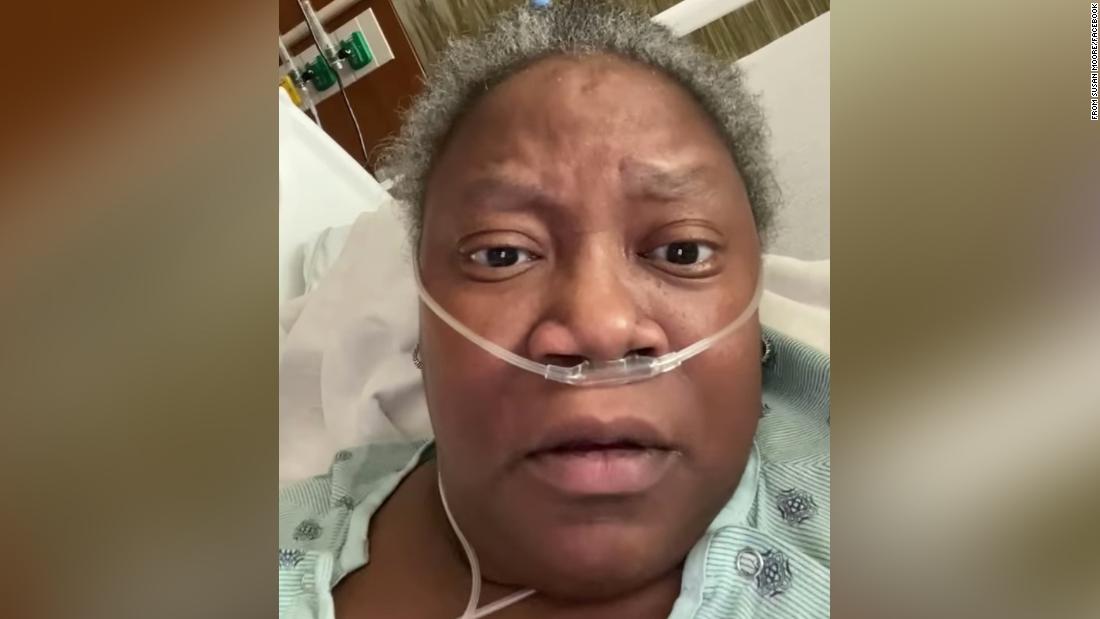Covid-19 in the US: Latinos die more than whites 2:13
(CNN) -
A black female doctor died of COVID-19 weeks after she said a white doctor dismissed her pain and expressed concerns about her treatment while lying in an Indiana hospital.
Dr. Susan Moore died Sunday of complications from Covid-19, her son told The New York Times.
The internist died about two weeks after sharing a video in which she accused a doctor at Indiana University Health North Hospital (IU North) of ignoring her complaints of pain and requests for medication because she was black, even though she was a patient herself. and doctor.
Dr. Susan Moore.
In a video that was posted earlier this month, Moore filmed herself from a hospital bed and recounted her experience at IU North.
Moore said her doctor played down her symptoms and said, "You're not even short of breath."
"Yes, I do," Moore said in the video, which he shared on Facebook on December 4.
The woman had to beg to receive remdesivir, she recalled in the video, the antiviral drug used to treat patients who are hospitalized for COVID-19 and do not need mechanical ventilation.
advertising
And despite her pain, the doctor told Moore he could send her home, she said, and he didn't feel comfortable giving her more medicine.
"It made me feel like I was a drug addict," she said in the video.
And he knew that I was a doctor.
Moore had also posted updates to his Facebook page along with the video.
Black children are 6 times more likely to be shot by police, study finds
Mistrust of the covid-19 vaccine is a problem 3:46
The black doctor denounced racism in her treatment for covid-19
Moore, who was an internist, said her pain was "adequately treated" only after she raised concerns about her treatment.
She was later discharged from IU North, but returned to a different hospital less than 12 hours later, she wrote on her Facebook page.
"I said and maintain that if I were white I wouldn't have to go through that," Moore said.
A spokesperson for IU North confirmed to CNN that Moore was a patient at the hospital and was ultimately released, but declined to say more about her, citing the patient's privacy.
"As an organization committed to equity and reducing racial disparities in health care, we take allegations of discrimination very seriously and investigate all allegations," the spokesperson said.
In a statement released Thursday, Dennis M. Murphy, president and CEO of Indiana University Health, defended the technical aspects of the treatment Moore received, while admitting “that we may not have shown the level of compassion and respect for which we struggle to understand what matters most to patients. "
He also requested an external review of the case.
«She is me and we are her»
Moore first tested positive for COVID-19 on November 29, according to his Facebook post.
On December 4, she was hospitalized at IU North in Carmel, Indiana.
It was only after a CT scan showed new lymphadenopathy, a disease in which the lymph nodes become enlarged, that the hospital agreed to treat her pain, she said.
"You have to prove you have something wrong with you in order to get the medicine," he said in the video.
Dr. Stanford said that lymphadenopathy would indicate that "the disease process went on for a period of time" and that Moore's body was fighting the disease.
According to her Facebook posts, Moore was finally able to speak with IU Healthcare's medical director, who said he would make sure she received the best care.
He also told her that diversity training would be held.
On Dec. 7, the hospital discharged Moore and sent her home, according to her Facebook post.
But less than 12 hours later, she was sent to a different hospital due to a fever and a drop in her blood pressure, according to the Facebook post.
Moore said he was receiving treatment for bacterial pneumonia and covid pneumonia.
She described the care at the second hospital as "very compassionate."
Racism and discrimination affect Latinos and blacks more in their fight against covid-19
Hispanic students, most affected by pandemic 0:59
The next day, Moore wrote that she was going to be transferred to the ICU.
It was the last update shared on his Facebook page.
Her story has resulted in a great deal of generosity from the listeners, and the GoFundMe page has raised over $ 100,000 as of Thursday night.
Dr. Alicia Sanders, another physician who first contacted Moore after seeing his video, helped start the page to raise funds for her family, including sending Muhammed back to school at the University of Indiana.
Sanders said the reason he first came into contact with Moore was "heartbreaking."
"She's me," said Sanders, who is also Black.
«She is me and we are her.
It could have been any of us that it happened to.
Stanford, who told CNN that he recognized implicit bias and racism in medicine but had chosen to try to change things from within the health care system, echoed that comment.
She told CNN that when she first heard about Moore's story, it stopped her in her tracks and made her cry.
She shared it with a group of her friends, all black surgeons from across the country.
Everyone could be identified, Stanford said, having undergone the same treatment despite their experience.
"We all have the stories," he said.
“If any of us get sick, please don't be silent.
Be attentive, be present, be public, "Stanford wrote to them, adding about Moore:" She was one of us.
- CNN's Sheena Jones and Mirna Alsharif contributed to this story.
covid-19 racism

